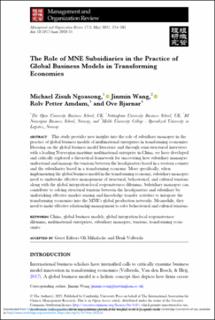The role of MNE subsidiaries in the practice of global business models in transforming economies
Journal article, Peer reviewed
Published version
Permanent lenke
https://hdl.handle.net/11250/2834875Utgivelsesdato
2021Metadata
Vis full innførselSamlinger
- Scientific articles [2181]
Sammendrag
This study provides new insights into the role of subsidiary managers in the practice of global business models of multinational enterprises in transforming economies. Drawing on the global business model literature and through semi-structured interviews with a leading Norwegian maritime multinational enterprise in China, we have developed and critically explored a theoretical framework for uncovering how subsidiary managers understand and manage the tensions between the headquarters based in a western country and the subsidiaries based in a transforming economy. More specifically, when implementing the global business model in the transforming economy, subsidiary managers need to undertake effective management of structural, behavioural, and cultural tensions along with the global integration-local responsiveness dilemma. Subsidiary managers can contribute to solving structural tensions between the headquarters and subsidiary by undertaking effective market sensing and knowledge transfer activities to integrate the transforming economies into the MNE's global production networks. Meanwhile, they need to make effective relationship management to solve behavioural and cultural tensions.

